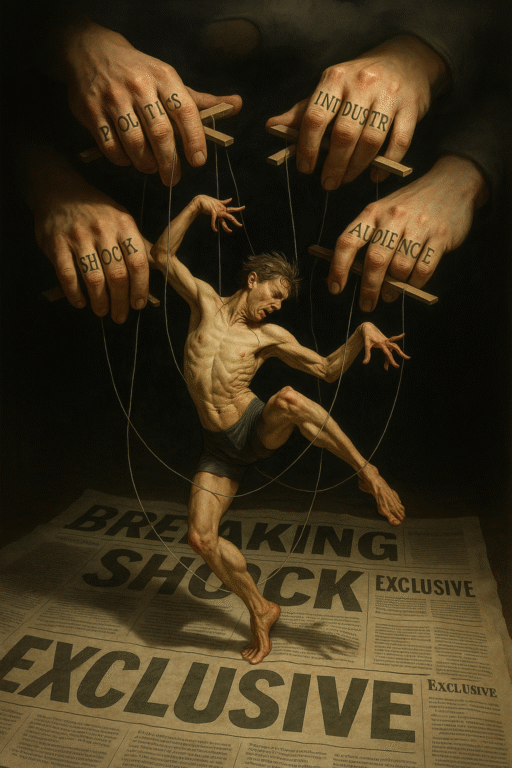Not a surprise
Media is a business
Modern media is not built to inform—it’s built to perform. Competing for attention, it turns headlines into bait and truth into a secondary concern. Emotion drives engagement; outrage sells. Journalism has become an optimization game, shaped by metrics, not meaning.
Eidoism sees this not as failure but as form. Media performs because we reward performance. Our collective hunger for validation creates a loop: the media delivers spectacle, and we feed it with clicks. Until this loop is exposed, content will mirror our unconscious needs, not our conscious values.

Media as Political and Industrial Tool
Behind the façade of neutrality, media often serves power. Ownership, advertising, and access all steer coverage toward political agendas and corporate interests. Stories are curated, not purely reported. Silence is often strategic.
Eidoism reveals how media and power co-evolve within the same recognition loop. Governments seek legitimacy; corporations seek approval. Media becomes their stage. As long as people identify with narrative instead of questioning structure, manipulation is effortless—and invisible.
Opportunists in the Spotlight
With the rise of influencers and alternative media, new voices claim to challenge the system. But many simply mimic it. They brand themselves as rebels, but perform for likes, donations, and identity affirmation. Authenticity is stylized, monetized, and algorithmically tuned.
Eidoism challenges this mimicry. It does not ask who is loudest, but what their voice serves. True resistance is not theatrical—it is structural. Opportunists recycle the same loop under different costumes. Recognition remains their fuel.
Political Pressure and Narrative Control
In times of crisis, governments don’t just manage events—they manage perception. They guide media, shape narratives, and suppress contradictions, often under the guise of public safety. Even democratic states craft consensus through soft coercion.
Eidoism sees this as scaled recognition-seeking. Politics is not about governing alone—it’s about being seen to govern. The more citizens reward spectacle, the more leaders perform. The loop survives through mutual dependency: politicians need applause; the public needs belief.
The Stage of Truth: Dismantling the Performance
Media is not broken—it is accurate. It reflects the structures we feed and the recognition we seek. Reforming it requires more than new platforms or regulations. It requires a shift in perception.
Eidoism offers that shift. It trains us to see beyond narrative into form, beyond identity into structure. Only then does media lose its grip as a tool of validation—and become a framework for understanding again.

